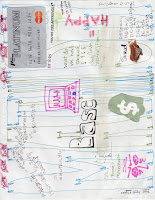... and thoughts about base materialism.
I found the reading interesting, thought-provoking and inspiring, but also difficult, provoking and arguable.
Interesting: I haven't been thinking too much about the different 'values' of materials as it is described in the text. Of course, I look at gold as a 'higher' material than dirt, or at least, that was how I thought of it before. On the other hand, I find dirt, (especially worm piss) to be much more useful than gold, since I'm a big fan of composting. For me personally, I don't think I changed my views of material's individual values per se, but more in the direction of what could be looked upon as 'useful' materials in the process of making art. I think the examples used to illustrate the different uses of materials in the book, though, might not be quite what Bataille meant (?), since they all more or less play on the symbolic values they have, being the material they are, like Burri's use of burnt plastic (or maybe not ...) Anyway, it is good to be aware of the potential uses of different materials, though it can be hard to use whatever material you like, without putting some symbolic meaning in to it (intentional or unintentional) in terms of how the viewer sees your artwork. (More on that later ...)
Thought-provoking: Well, being reminded that "Even shit is pretty" has to be thought-provoking, and maybe also just provoking (if I understand these terms in the right way) ... I mean, what is 'pretty' anyway? Who defines what is 'pretty' or not? Does it have to be pretty? ... and so on, I guess.
Arguable: I'm not sure if I quite see where Bataille is going with his arguments when he refers to Freud and his own psychological history when he talks about base materialism. It is like he is trying to explain something concrete with something abstract, and that doesn't quite do it for me. (I mean, I can see that there is a hierarchy going on, and that it can be a good thing to get rid of that. On the other hand, II feel like the whole idea of the hierarchy is more or less constructed by Bataille, and thus has a greater theoretical interest than practical) So, base materialism is about declassifying, "lowering, and liberating from all ontological prisons", but to what? Just materials? No real value, symbolic value, or pretended value? If that was the thought, I would both say that that is impossible (they will always have some sort of value, especially in a symbolic way), but also an attempt to neutralize something that has a necessary and useful value in itself. It would be like saying that all colors should be the same, however you choose to use your color palette, they all mean the same. (Maybe not quite, but something like that ...)
So, I've only read this twice, and even though I feel like I get what they are talking about, the things they are talking about are often very deep and theoretical, so there are no easy answers to their questions (and I understand that we are not supposed to look for direct answers, but actually rather more questions to ask ...) Also, the fact that they are referring to other philosophers, like Freud, Marx, Hegel, Sade, and Breton, makes it kind of hard, since I don't have much specific knowledge of these people from before ... I do believe, though, that most of us today are 'enlightened' people that can reason on behalf of what we all ready know, with our own experiences in life, and that those experiences are much more valuable than anything else.
--
Knut :)


 This blog is a visual aid from verbal regurgitation caused from Formless and a lot of coffeee.
This blog is a visual aid from verbal regurgitation caused from Formless and a lot of coffeee.
